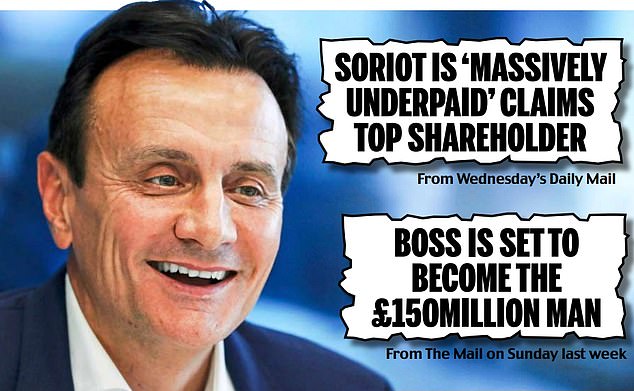Astrazeneca was rocked by a shareholder revolt as more than a third of investors rebelled over big salaries.
In a decisive vote yesterday, investors approved a new deal that will pay chief executive Pascal Soriot up to £18.7m this year.
This would take his total earnings to £153 million since taking over the pharmaceutical giant in 2012.
But in a blow to the French-Australian executive, 35 per cent of shareholders voted against the pay package and the performance-based share plan on which it is based.
Under the proposals, Soriot, 64, will earn a bonus of up to 300 per cent of his base salary of almost £1.5m, plus performance-related stock awards worth up to 850 per cent of the base salary.
In a decisive vote yesterday, Astrazeneca investors approved a new deal that will give chief executive Pascal Soriot (pictured) up to £18.7m this year.
This is an increase from the previous salary agreement, which allowed for a 250 percent bonus and awards worth 650 percent of his base salary.
These changes will ultimately make Soriot the FTSE 100’s first £150m chief executive.
Astra said it was “pleased” the plans had been approved, but “will continue to engage with our shareholders and proxy advisors to explain our need for global benchmarks and pay for performance.”
The backlash came after influential shareholder advisory groups Glass Lewis and ISS last week urged investors to vote against the “excessive” remuneration plan at the annual meeting.
Glass Lewis said there is an “absence of compelling evidence” that Soriot is underpaid.
The revolt will earn Astra a place on a “list of shame” compiled by trade body The Investment Association. This includes companies where more than 20 percent of shareholders vote against employer compensation.
Soriot has been widely praised for reviving the fortunes of one of Britain’s biggest pharmaceutical companies and providing millions of people with a life-saving Covid vaccine. He also fought off an unwanted takeover bid from US rival Pfizer.
This has earned Soriot an avalanche of followers.
This week, Florida-based GQG Partners supported Soriot, arguing that it had earned the right to a decent raise thanks to its turnaround efforts.
Rajiv Jain, chief investment officer at GQG, said: ‘There is a compensation issue. The CEO is grossly underpaid, given AstraZeneca’s impressive turnaround since he joined more than a decade ago.
Norges Bank Investment Management, a top ten shareholder, also backed Soriot’s promotion.
Top City business figures, including Julia Hoggett, head of the London Stock Exchange, are pushing for executives to get more cash.
He called for a “constructive discussion” on executive pay, saying Britain needed to attract the best talent. Astra has argued that the increase is “necessary to increase the competitiveness” of the business against its rivals in the United States and Europe.
Dame Emma Walmsley, chief executive of British rival GSK, received £12.7m last year, compared to Soriot’s £16.9m.
Albert Bourla, director of Pfizer, took home £17 million.
And one of the world’s highest earners in the pharmaceutical sector is David Ricks, head of Eli Lilly, who was paid £21 million in 2023.
Soriot’s salary has generated controversy in the past.
Nearly 40 percent of the votes cast at the 2021 shareholder meeting were against the company’s salary plan, which is set every three years.

